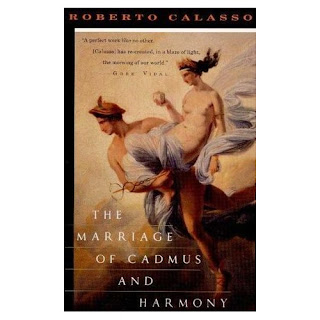
I read this book on the recommendation of Bo in an earlier comment on this blog. First published in English in 1993 it’s clearly something I should have picked up before now. Or should I? Initially I felt, by turns, beguiled, exploited, delighted and even insulted. It seemed to me, before I was very far in, to be moving between the profound and the whimsical across the space of a single page. I was not sure whether I regarded it as an insightful interpretation of Greek mythology or a comic-book vision of the gods. I also felt that I should actually be reading Le nozze di Cadmo e Armonia, not just because it is usually better to read things in their original language but because it felt like a very Italian text even via the American English into which it has been translated. I was reminded of the style of Ripellino in his Praga Magica. Perhaps ‘style’ is the best way to approach a description of the book. Its originality of presentation of the gods owes everything to its style. The way things are said is as significant as what is said. Once I had accommodated myself to that I began to enjoy it.
And there is much to enjoy. There was a time when Cadmus and Harmony could get married at Thebes and the gods would come to the wedding. But since then they have withdrawn, to Olympus and further off. The Golden Age and its dissolution through Silver to Iron and Bronze is chronicled here with as much élan as could be wished for. But those stretches of apparent frivolity, crystallize into some cameos which are worth reading the book for in themselves:
Dionysus is not a useful god who helps weave or knot things together, but a god who loosens and unties. The weavers are his enemies. Yet there comes a moment when the weavers will leave their looms and dash off after him into the mountains. Dionysus is the river we hear flowing by in the distance, an incessant booming from far away; then one day it rises and floods everything, as if the normal above-water state of things, the sober delimitation of our existence, were but a brief parenthesis overwhelmed in an instant.
This is brilliant stuff and brings the gods alive in a way that other works rarely do. If I consider how else readers of English might gain an understanding of these gods, I suppose the comprehensive text that would be referred to is Robert Graves’ The Greek Myths. Graves is himself often whimsical and irreverent, but compared to Calasso his is a mere reference book, and one than can itself deceive by appearing to be so definitive when he is, of course, as liable to be arbitrary in his interpretations and definitions as is Calasso. But with the Italian it is all on the surface, part of appearance, as he himself defines one aspect of the gods. Besides, this is a book to be read through; Graves’ two volumes sit on the reference shelf to be consulted rather than followed as narrative.
I must, finally, comment on the presentation of the relationship between Odysseus and Athena. I found it epiphanic. I’ll resist the temptation to quote from it as it’s the sort of thing best discovered rather than isolated from its context. And here I have to concede that the apparently arbitrary way that Calasso throws in brief paragraphs of information between longer stretches of narrative and illustration, creating an apparently disjointed structure, as if wondering where this bit or that bit can best be fitted in, is not so whimsical after all. He has created a form that is disconcertingly effective, encompassing the many contradictions which can thwart the task of description and casting light, sometimes directly but often elliptically on his subjects. "In the beginning was the word" says the christian text. In Calasso's view, for the gods, it was more like the end. Except that his words attempt to reclaim them as the only way to lead an interesting life
1 comment:
Glad you enjoyed it. His Indian sequel, Ka, is equally fascinating.
Post a Comment